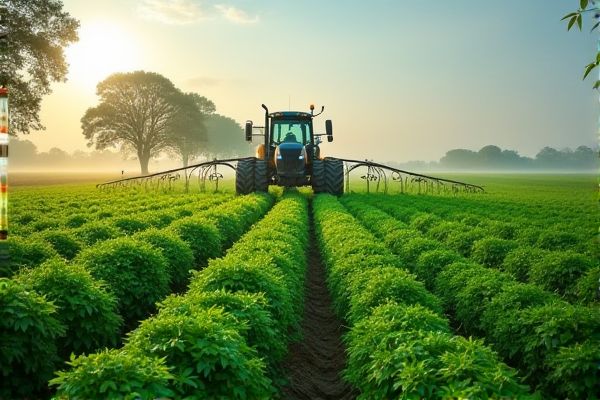
India offers a variety of irrigation job opportunities due to its extensive agricultural sector and the need for efficient water management systems. Roles available include irrigation engineers, agronomists, and field technicians, each contributing to the development and maintenance of irrigation projects. Government agencies, non-governmental organizations, and private companies actively seek professionals with expertise in modern irrigation techniques, such as drip and sprinkler systems. Skill sets in project management, environmental science, and agricultural practices enhance employability in this growing field.
Job Description
Irrigation jobs in India primarily involve the design, implementation, and management of irrigation systems to enhance agricultural productivity. Professionals in this field work closely with farmers to assess their water needs and recommend efficient irrigation techniques, such as drip or sprinkler systems. Understanding local climate conditions and soil types is essential for optimizing water usage and ensuring sustainability. With the increasing focus on resource management, opportunities in this sector are expanding, making it an ideal career path for individuals passionate about agriculture and environmental conservation.
Requirement
Irrigation jobs in India typically require a background in agricultural engineering, environmental science, or a related field. Proficiency in designing and managing irrigation systems, along with knowledge of water resources management, is essential. Familiarity with modern technologies such as drip and sprinkler systems can give you a competitive edge. Hands-on experience with project implementation and maintenance is often sought by employers in the agricultural sector.
Salary and Perks Expected
Irrigation jobs in India offer a competitive salary that can vary based on experience, location, and the organization. Entry-level positions typically start around Rs20,000 to Rs30,000 per month, while experienced professionals can earn upwards of Rs50,000 or more. In addition to salaries, many employers provide perks such as health insurance, travel allowances, and opportunities for professional development. Understanding the expected compensation and benefits can help you make informed decisions when exploring career opportunities in this field.
Similar Job Names
- Irrigation Engineer
- Water Resource Specialist
- Agricultural Engineer
- Irrigation Technician
- Project Manager (Irrigation)
- Hydrogeologist
- Irrigation Designer
- Landscape Irrigation Consultant
- Drip Irrigation Specialist
- Canal Maintenance Supervisor
- Irrigation Project Coordinator
- Crop Water Management Officer
- Irrigation System Operator
- Agricultural Water Management Engineer
- Irrigation Research Scientist
Job Expectation Concept
Irrigation jobs in India play a crucial role in enhancing agricultural productivity, particularly in a country where a significant portion of the population relies on farming for livelihood. These positions typically involve managing water resources effectively, including the design, implementation, and maintenance of irrigation systems. Skilled professionals are in demand to ensure sustainable practices that address water scarcity and optimize crop yield. Pursuing a career in this field offers opportunities to contribute to food security and environmental conservation, vital for India's future.
Career Advantage and Weakness
Irrigation jobs in India offer significant career advantages, including the potential for steady employment and job security due to the essential nature of water management in agriculture. Professionals in this field often benefit from government initiatives aimed at improving agricultural productivity, which creates numerous opportunities for growth and development. However, challenges such as seasonal employment fluctuations and the physical demands of the work can pose weaknesses. Understanding these dynamics is crucial for anyone considering a career in irrigation management, as they impact long-term job satisfaction and career progression.
Important Thing Must Know
Irrigation jobs in India play a crucial role in enhancing agricultural productivity and ensuring water management across various regions. With a vast agricultural landscape and diverse climatic conditions, the demand for skilled workers in irrigation systems, maintenance, and management is significant. Government initiatives and projects aimed at improving water conservation and distribution create a variety of employment opportunities in this sector. Many irrigation jobs also involve working with modern technologies, such as drip irrigation and sprinkler systems, which are gaining popularity in water-scarce areas. Pursuing a career in this field can contribute to sustainable farming practices while supporting the livelihoods of countless farmers across the country.
Alternative Career Options
Irrigation jobs in India offer valuable skills that can transition into various alternative career options. Opportunities in agricultural management, where knowledge of irrigation systems enhances farm productivity, are widely available. Environmental consultancy also serves as a viable path, focusing on sustainable water use and conservation practices. Exploring roles in project management within government and non-governmental organizations can further leverage your expertise in water-related initiatives.
Companies List
- Tata Projects
- Jain Irrigation Systems
- Mahindra Agribusiness
- IL&FS Engineering and Construction Company
- Netafim Agricultural Financing
- Ruchi Soya Industries
- Punjab Irrigation Department
- Green India
- Wipro Water
- Hindustan Aeronautics Limited (HAL)
List of Ideal City
Cities in India that are ideal for irrigation jobs include Pune, known for its agricultural research centers and proximity to major farming areas. Hyderabad offers advanced irrigation technology firms, providing ample opportunities for professionals in this field. Ahmedabad, with a growing focus on sustainable water management, has numerous projects related to irrigation systems. Jaipur presents prospects in both government and private sectors, emphasizing modern irrigation techniques to support its vast agricultural landscape.
 jobs-india.net
jobs-india.net